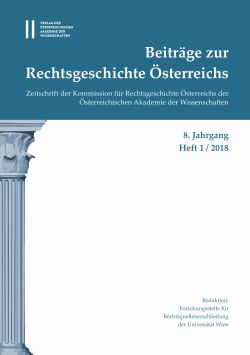
Beiträge zur Rechtsgeschichte Österreichs 1 / 2018, pp. 200-215, 2018/06/05

Even after 1848, Hungary’s constitution remained a so‐called ‘historic constitution’, a term which emphasises the central role of customary rules developed during previous centuries. The present paper aims to examine the extent to which this particular source of law persevered in certain elements of state administration and establishment. As experience shows, customary law was preserved primarily within the scope of regal authority, although during the late Middle Ages it is clearly traceable in the process of the separation of legislative and executive powers. Consequently, the daily functioning of the Parliament equally contains many rules stemming from customary law. However, the separation of administration and judiciary was processed via statutory measures for the most part, thus in this respect customary law failed to prevail.
Keywords: customary law – history of Hungarian constitution – state establishment